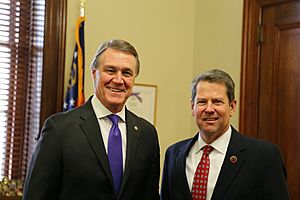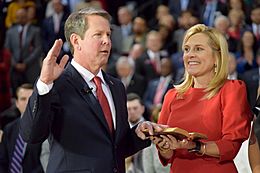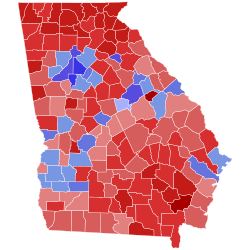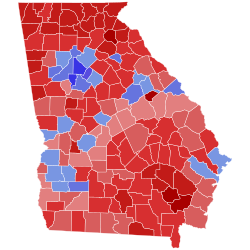Brian Kemp facts for kids
Quick facts for kids
Brian Kemp
|
|
|---|---|

Kemp in 2023
|
|
| 83rd Governor of Georgia | |
| Assumed office January 14, 2019 |
|
| Lieutenant | Geoff Duncan (2019–2023) Burt Jones (2023–present) |
| Preceded by | Nathan Deal |
| Chair of the Republican Governors Association | |
| Assumed office November 20, 2024 |
|
| Preceded by | Bill Lee |
| 27th Secretary of State of Georgia | |
| In office January 8, 2010 – November 8, 2018 |
|
| Governor | Sonny Perdue Nathan Deal |
| Preceded by | Karen Handel |
| Succeeded by | Robyn Crittenden |
| Member of the Georgia State Senate from the 46th district |
|
| In office January 3, 2003 – January 3, 2007 |
|
| Preceded by | Doug Haines |
| Succeeded by | Bill Cowsert |
| Personal details | |
| Born |
Brian Porter Kemp
November 2, 1963 Athens, Georgia, U.S. |
| Political party | Republican |
| Spouse |
Marty Argo
(m. 1994) |
| Children | 3 |
| Residence | Georgia Governor's Mansion |
| Education | University of Georgia (BS) |
| Signature | |
Brian Porter Kemp, born on November 2, 1963, is a well-known American politician. He is currently the 83rd Governor of Georgia, a role he has held since 2019. Before becoming governor, he was Georgia's Secretary of State from 2010 to 2018. He also served in the Georgia State Senate from 2003 to 2007. He is a member of the Republican Party.
Kemp studied at the University of Georgia. Before entering politics, he owned businesses in farming, finance, and real estate. In 2002, he was elected to the Georgia State Senate. In 2010, Governor Sonny Perdue chose Kemp to be Secretary of State. He won a full term in that role in 2010 and was reelected in 2014.
Kemp ran for governor in 2018 against Stacey Abrams. He won the election and then stepped down as Secretary of State. In his first term as governor, Kemp made decisions about the COVID-19 pandemic. He also signed a new election law in 2021. In 2022, Kemp was reelected governor, again defeating Stacey Abrams.
Contents
Early Life and Education
Brian Kemp was born in Athens, Georgia. His family has a history in politics. His grandfather, Julian H. Cox, was a member of the Georgia Legislature.
Kemp attended Athens Academy for some of his schooling. He then transferred to Clarke Central High School, where he played football. He graduated in 1983. Later, he earned a degree in agriculture from the University of Georgia.
Early Career in Politics
Before becoming a full-time politician, Kemp worked as a home builder and developer.
He served as a Georgia State Senator from 2003 to 2007. He won this position by defeating the person who held the seat before him, Doug Haines. In 2006, Kemp tried to become the Agriculture Commissioner of Georgia. He did not win that election.
Serving as Georgia's Secretary of State

In 2010, Governor Sonny Perdue appointed Brian Kemp as the Georgia Secretary of State. This job involves overseeing elections and business registrations in the state.
Kemp won the election for a full term as Secretary of State in 2010. He received 56.4% of the votes. Four years later, he was reelected to the same position.
During the 2016 election, Kemp was the only state official to decline help from the Department of Homeland Security. This help was offered to protect election systems.
After winning the 2018 election for governor, Kemp resigned from his role as Secretary of State.
Running for Governor
2018 Election for Governor
In 2018, Brian Kemp ran for Governor of Georgia. The primary elections were held in May, and a runoff election took place in July. Kemp won the Republican primary runoff against Casey Cagle.
The main election was held on November 7, 2018. Kemp faced the Democratic candidate, Stacey Abrams. Kemp declared victory the day after the election. He then resigned as Secretary of State.
Kemp won the election by a small margin, with 50.2% of the votes compared to Abrams' 48.8%. This was one of the closest governor's races in Georgia in many years.
2022 Election for Governor
In the 2022 primary election, Kemp was challenged by former U.S. Senator David Perdue. Even though former President Donald Trump supported Perdue, Kemp won the primary election by a large amount.
In the general election, Kemp again faced Stacey Abrams. This was the first time in Georgia's history that the same two candidates ran against each other for governor twice in a row.
Kemp won reelection to his second term, defeating Abrams by a larger margin than in 2018. Abrams accepted the results on election night. Kemp was sworn in for his second term on January 12, 2023.
As Governor of Georgia

Brian Kemp officially became governor in a public ceremony in Atlanta on January 14, 2019. He began his second term on January 9, 2023.
Election Laws
In April 2019, Governor Kemp signed a new law about elections. This law made changes based on issues from the 2018 election. For example, it set rules for changing polling places and checking absentee ballots.
In March 2021, Kemp signed a new election law called SB 202. This law changed several things about voting in Georgia. It expanded early in-person voting and added ID requirements for absentee ballots. It also gave the state more control over local election officials.
Economy and Development
In September 2019, Kemp visited Swainsboro to announce a new plan. This plan created a special team to help with economic growth in rural areas of Georgia.
Health Care Initiatives
Governor Kemp has supported efforts to change the Affordable Care Act. He has also worked to make it harder for Georgia residents to use some parts of the Affordable Care Act. Kemp and other Republicans in Georgia have not supported expanding Medicaid fully. He has also tried to add work requirements for people receiving Medicaid.
Important Appointments
When U.S. Senator Johnny Isakson retired, Governor Kemp appointed businesswoman Kelly Loeffler to fill his Senate seat. Loeffler took office in January 2020.
Kemp also appointed Carla Wong McMillian to the Supreme Court of Georgia. This happened when a judge retired from the court.
COVID-19 Pandemic Response
On April 1, 2020, Governor Kemp announced a statewide stay-at-home order. This was to help stop the spread of COVID-19 pandemic. He was one of the last governors to issue such an order.
At the end of April, Kemp lifted the stay-at-home order. This decision was made even though some mayors and health experts disagreed. In July, Kemp also prevented cities and counties in Georgia from requiring people to wear face masks. At that time, coronavirus cases were increasing in many states.
Public Opinion
Polls show how people feel about Governor Kemp's job performance. In April 2019, about 46% of Georgians approved of his work. By July of that year, his approval rating had risen to 52%.
In May 2020, his approval rating dropped to 39%. This was linked to how he handled the coronavirus crisis. However, his approval rating began to rise again in 2021. By April 2022, it reached 50%. In October 2022, just before the election, it was 54%. At the start of his second term in 2023, his approval rating went up to 62%.
Personal Life
Brian Kemp married Marty Argo on January 8, 1994. Marty is the daughter of a former member of the Georgia House of Representatives, Bob Argo. They have three daughters together. The Kemp family attends Emmanuel Episcopal Church in Athens.
Images for kids
See also
 In Spanish: Brian Kemp para niños
In Spanish: Brian Kemp para niños
 | Laphonza Butler |
 | Daisy Bates |
 | Elizabeth Piper Ensley |





